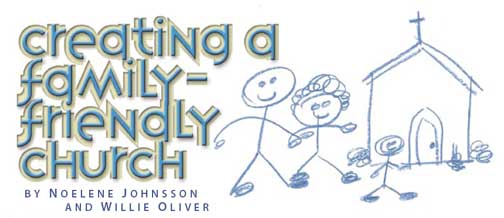- Let the Children Come to Me -


(from the September 2003 issue)
Also see Resources for Family-centered Ministry
(This page is printer-friendly)
Wildebeest, also known as gnu or African antelope, mate and give birth to their young during their annual migration to the Serengeti plains in Tanzania, East Africa. Hyenas also roam the Serengeti, stalking the wildebeest calves. Aware of these predators, a mother wildebeest immediately upon giving birth begins nudging the weak newborn to its feet. It is not uncommon to see hyenas stalk the helpless young within minutes of birth. In an effort to protect her calf, the mother will counterattack. But the hyenas, working as a pack, often keep the mother distracted until a lone predator can get the calf.
Observers tell us that thousands of wildebeest graze nearby, raising their heads to watch this drama as it unfolds. If they acted together, they could easily outnumber the hyenas. But not one wildebeest makes a move to help mother or calf.
 |
| When prayer requests are expressed, Ryan Wick asks the congregation to join him in praying for his mother, who faces surgery. |
The wildebeest herd typifies a dysfunctional church(quite the opposite of a family-friendly church that makes ministry family-centered and church-supported. Family-friendly churches recognize that parents have the primary responsibility for the spiritual nurture of the child. But at the same time the church stands ready to assist and support the ministry of the home.
Three ways family-friendly churches offer support are by:
- Making church child-friendly.
- Making church a safe place for children to accept Jesus.
- Supporting and training parents for discipleship of the child.
A Case Study
The Kuna Seventh-day Adventist Church, near Boise, Idaho, is a family-friendly church. "Our style of doing church is informal and can appear disorganized," confesses Aileen Sox, one of Kuna's church elders. "We'll probably always run a little late, a little long, and a whole lot casual on Sabbath morning. But for Kuna that is small stuff. With the big stuff, we get it right. We pay attention to kids."
Kuna's first Vacation Bible School in a number of years attracted 100 children and more than 50 volunteers!
Generous members subsidize part of the tuition (in some cases all of it) for a number of Kuna children to attend church school. Nobody complains about spending money for Sabbath school furniture or supplies for Vacation Bible School.
Kuna members applaud kids and involve them every week in church services. Children sometimes read the morning's Scripture passage, sing or play special music, and sing with the children's praise team. Junior deacons and deaconesses have assignments whenever their adult mentors do. Kids greet at the front door along with their parents or older siblings.
 |
| Kuna kids enjoy their "baby fishy" booster seats. The seats help kids see more than the back of people's heads during church. |
The church applauds children's achievements—honor roll, graduation, community awards—during praise or announcement time. Kids' prayer requests are taken to God's throne just as seriously as are adults' requests. The children's offering may not be the biggest cash offering each Sabbath morning, but it could be the bulkiest. Nobody can resist the children, each carrying a basket to be filled.
At Kuna they don't mind the noise generated by children during a worship service, which they hold before Sabbath school so children will endure it better. The church provides "busy" bags for each child under age 10, and has booster seats to help kids ages 1–5 see what is going on up front during the service. And Kuna gives parents wireless headsets from the sound system so they can listen to the sermon while walking their restless toddlers.
At Christmas Kuna kids each receive a book from Pacific Press or the Review and Herald; at their dedications, babies receive a toddler's worship book; and at baptisms, candidates receive a Bible. When a baby is born, the pastor visits the hospital with a copy of Kay Kuzma's book Preparing for Your Baby's Dedication: A Guide for Parents. "Kuna wants parents to know right from the beginning their church will participate in their child's spiritual life," Aileen says.
Not surprisingly, Kuna has experienced amazing growth, from 20 families to 85—most of it in the past six years. 1
Childhood's Window of Opportunity
Bill Hybels, one of America's best-known pastors, says, "The single remaining common interest or entrance point for nonchurched people into the life of the church is children. ... We have a wide-open door to almost every family in every community worldwide when we love and serve their kids." 2 Parents want their children involved in outstanding programs. And if the kids love being there, parents will keep bringing them back. Eventually the whole family will stay for church.
Barna Research Group, in November 1999, reported their findings that childhood is the most important time for deciding for Christ. A century ago Ellen White wrote: "It is in these early years that the affections are the most ardent, the heart most susceptible of improvement." 3
 |
| Children's Sabbath gives children the opportunity to stand before their congregations as worship leaders. |
Barna's nationwide survey showed the probability of people accepting Jesus Christ as their Savior in relation to their age. Children from 5 to 13 have a 32 percent probability of accepting Jesus; ages 14 to 18, only 4 percent; 19 and older, 6 percent. This data flies in the face of the way we do church.
If childhood is evangelism's window of opportunity, should we not be more intentional about allocating budgets and evangelistic efforts where they will be most productive, rather than to an audience that is six to eight times less open?
Making Church Safe for Children
If we would make our churches family-friendly, we must ensure that both the church facility and church family are safe for children. When children are molested, they do not suffer alone; the whole family grieves. When the perpetrator is a church member and denies what happened, the whole church can take sides—everyone hurts, and ministry is derailed.
Family-friendly churches plan ahead to make church a safe place for children to come to know Jesus. A few simple rules can protect both children and the church's ministry:
- Have those who hold positions of trust in the church fill out volunteer screening forms.
- Wait six months before giving new and previously unknown members a church office.
- Avoid having adults working one on one with a child, but if they must, leave the classroom door open so that anyone can look in.
Supporting Parents, Teaching Discipleship
Family is the place where children learn and experience love, affection, values, and God. In the home, children learn to be connected to or disconnected from each other, not only by what parents and guardians say, but also by what the children experience.
Families who experience high rates of cohesion, connectedness, and spiritual and relational health intentionally connect with each other every day. Family worship not only connects family members at the beginning of each day, but also builds spirituality and relationships. Recently Barna Research reported that nine out of 10 parents of children under the age of 13 believe they are responsible for communicating their values and religious beliefs to their children. Yet in a typical week, most parents don't spend any time discussing religious matters or sharing religious materials with their children. 4
Unfortunately, many families in the congregation do not understand the importance of family worship, and even if they do, they don't know how to go about it. This is where churches can help. Parenting seminars and tips from the pulpit can support parents and show them what to do.
A new children's discipleship opportunity is opening up for churches. A Kids in Discipleship Center, under the leadership of Don MacLafferty, has been launched as a pilot project at the Collegedale Church in Tennessee. Sponsored by the Georgia-Cumberland Conference, Southern Union, and the North American Division, the project goal is to create a child discipleship plan at the local church level to systematically integrate each child into the heart of worship, ministry, and mission.
"Footprints in the Sand, Part I, the first set of 12 lessons, helps parents, in a small group setting, become committed disciples," Don explains. "Footprints, Part II, brings together the parents and children, working as families to study through a series of 32 lessons." This series gets children into a personal relationship with Jesus, develops habits of personal and family devotions, and encourages service and witnessing. Eventually some of these families will become involved in mentoring other families in the discipleship process.
We all want our kids and grandkids to grow up to be responsible members of society at large. And we surely want them to love and serve God as they grow older. This doesn't happen by chance, or by providing random, sporadic attempts at communicating our religious and cultural values. We need to be deliberate in how we communicate our faith to our kids. It's our responsibility to them—and to Jesus.
Footnotes
Reprinted with permission from the Adventist Review.
Also see Resources for Family-centered Ministry
What is the Herald? | Herald online | Label Updates | Submit information | Advertise |
Info in past issues | Contact us LUC Main Menu | About Us | Conferences | Departments | Feedback | Links
Copyright © 2003 by Lake Union Conference
of Seventh-day Adventists.
Website hosting, maintenance and ecommerce by Hosford
Web Service

